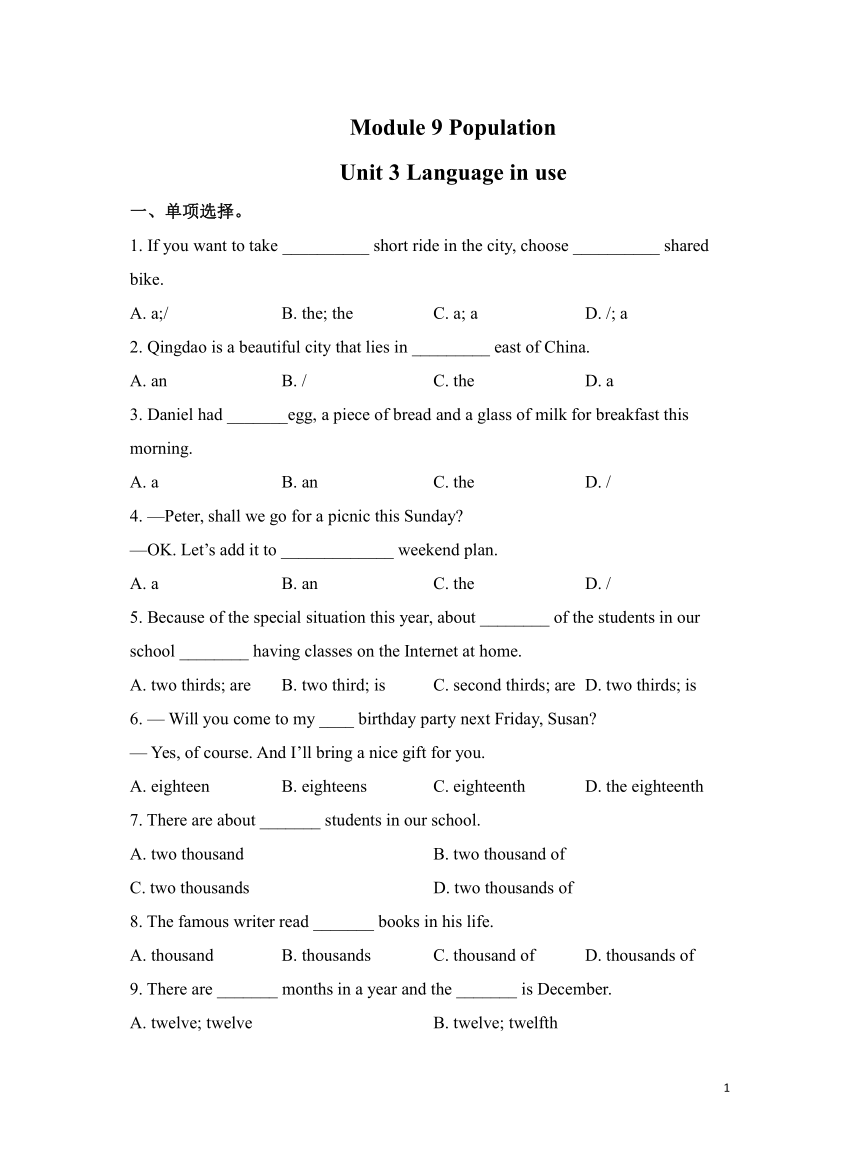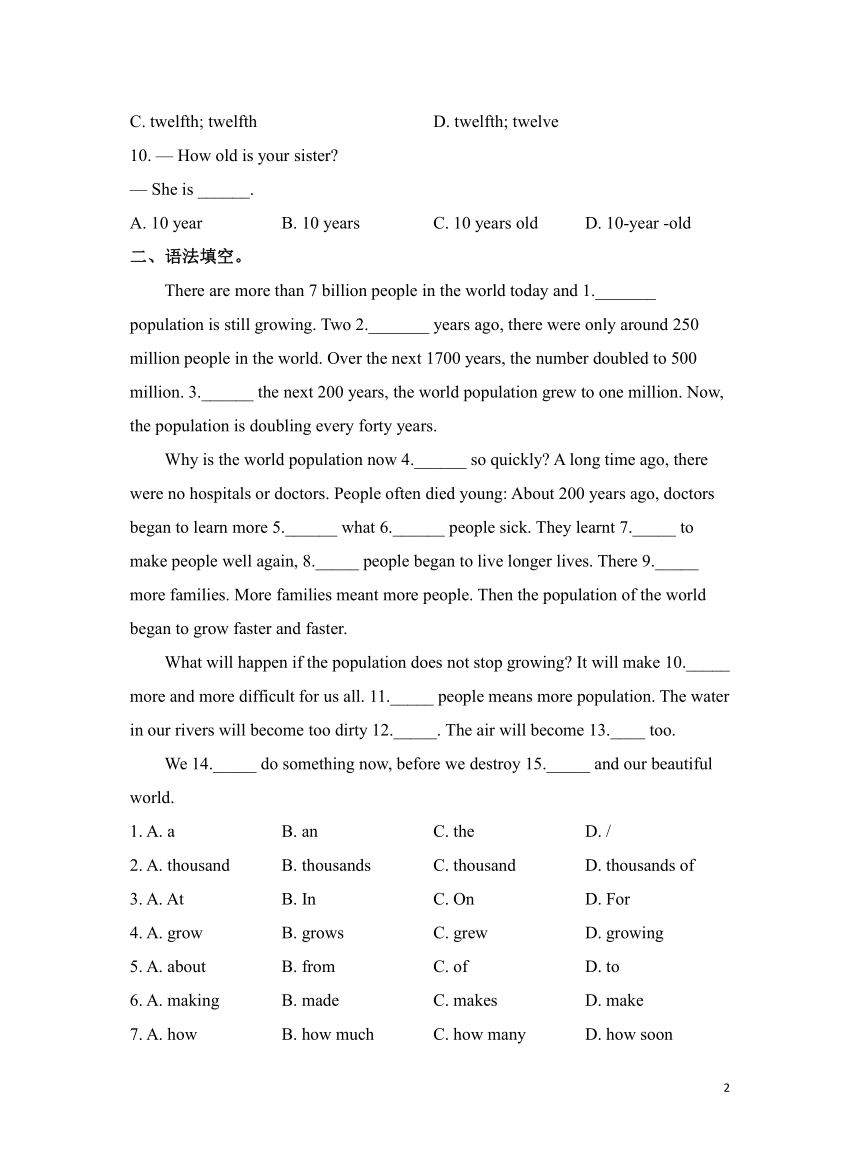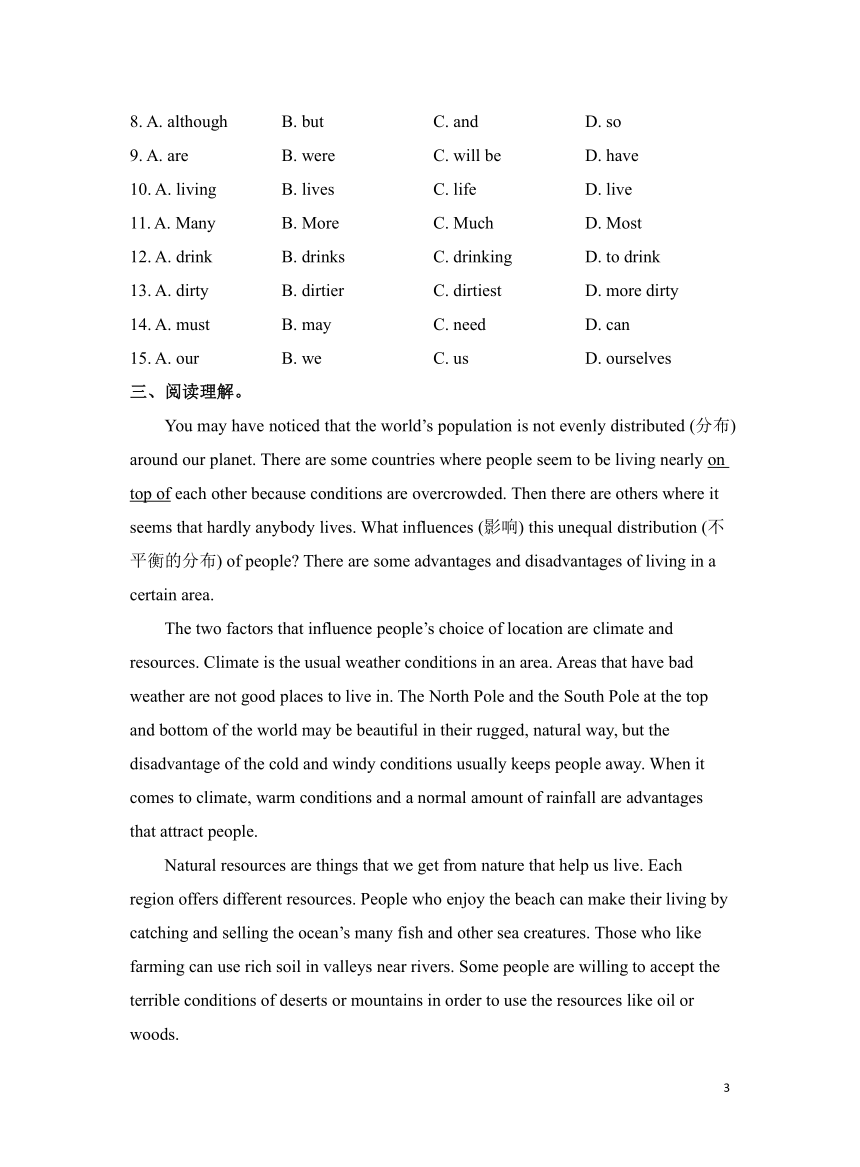初中英语外研版八上Module 9 Population.Unit 3 Language in use作业(含解析)
文档属性
| 名称 | 初中英语外研版八上Module 9 Population.Unit 3 Language in use作业(含解析) |  | |
| 格式 | doc | ||
| 文件大小 | 49.0KB | ||
| 资源类型 | 教案 | ||
| 版本资源 | 外研版 | ||
| 科目 | 英语 | ||
| 更新时间 | 2023-08-30 16:52:22 | ||
图片预览



文档简介
Module 9 Population
Unit 3 Language in use
一、单项选择。
1. If you want to take __________ short ride in the city, choose __________ shared bike.
A. a;/ B. the; the C. a; a D. /; a
2. Qingdao is a beautiful city that lies in _________ east of China.
A. an B. / C. the D. a
3. Daniel had _______egg, a piece of bread and a glass of milk for breakfast this morning.
A. a B. an C. the D. /
4. —Peter, shall we go for a picnic this Sunday
—OK. Let’s add it to _____________ weekend plan.
A. a B. an C. the D. /
5. Because of the special situation this year, about ________ of the students in our school ________ having classes on the Internet at home.
A. two thirds; are B. two third; is C. second thirds; are D. two thirds; is
6. — Will you come to my ____ birthday party next Friday, Susan
— Yes, of course. And I’ll bring a nice gift for you.
A. eighteen B. eighteens C. eighteenth D. the eighteenth
7. There are about _______ students in our school.
A. two thousand B. two thousand of
C. two thousands D. two thousands of
8. The famous writer read _______ books in his life.
A. thousand B. thousands C. thousand of D. thousands of
9. There are _______ months in a year and the _______ is December.
A. twelve; twelve B. twelve; twelfth
C. twelfth; twelfth D. twelfth; twelve
10. — How old is your sister
— She is ______.
A. 10 year B. 10 years C. 10 years old D. 10-year -old
二、语法填空。
There are more than 7 billion people in the world today and 1._______ population is still growing. Two 2._______ years ago, there were only around 250 million people in the world. Over the next 1700 years, the number doubled to 500 million. 3.______ the next 200 years, the world population grew to one million. Now, the population is doubling every forty years.
Why is the world population now 4.______ so quickly A long time ago, there were no hospitals or doctors. People often died young: About 200 years ago, doctors began to learn more 5.______ what 6.______ people sick. They learnt 7._____ to make people well again, 8._____ people began to live longer lives. There 9._____ more families. More families meant more people. Then the population of the world began to grow faster and faster.
What will happen if the population does not stop growing It will make 10._____ more and more difficult for us all. 11._____ people means more population. The water in our rivers will become too dirty 12._____. The air will become 13.____ too.
We 14._____ do something now, before we destroy 15._____ and our beautiful world.
1. A. a B. an C. the D. /
2. A. thousand B. thousands C. thousand D. thousands of
3. A. At B. In C. On D. For
4. A. grow B. grows C. grew D. growing
5. A. about B. from C. of D. to
6. A. making B. made C. makes D. make
7. A. how B. how much C. how many D. how soon
8. A. although B. but C. and D. so
9. A. are B. were C. will be D. have
10. A. living B. lives C. life D. live
11. A. Many B. More C. Much D. Most
12. A. drink B. drinks C. drinking D. to drink
13. A. dirty B. dirtier C. dirtiest D. more dirty
14. A. must B. may C. need D. can
15. A. our B. we C. us D. ourselves
三、阅读理解。
You may have noticed that the world’s population is not evenly distributed (分布) around our planet. There are some countries where people seem to be living nearly on top of each other because conditions are overcrowded. Then there are others where it seems that hardly anybody lives. What influences (影响) this unequal distribution (不平衡的分布) of people There are some advantages and disadvantages of living in a certain area.
The two factors that influence people’s choice of location are climate and resources. Climate is the usual weather conditions in an area. Areas that have bad weather are not good places to live in. The North Pole and the South Pole at the top and bottom of the world may be beautiful in their rugged, natural way, but the disadvantage of the cold and windy conditions usually keeps people away. When it comes to climate, warm conditions and a normal amount of rainfall are advantages that attract people.
Natural resources are things that we get from nature that help us live. Each region offers different resources. People who enjoy the beach can make their living by catching and selling the ocean’s many fish and other sea creatures. Those who like farming can use rich soil in valleys near rivers. Some people are willing to accept the terrible conditions of deserts or mountains in order to use the resources like oil or woods.
1. The underlined part “on top of” in the first paragraph most likely means ________.
A. very close to B. on the highest part of
C. in control of D. on the surface of
2. What are the main factors that influence the distribution of people
A. Resources and oceans. B. Climate and rivers.
C. Climate and resources. D. Warm conditions and rainfall.
3. The writer thinks many people don’t live near the North Pole or the South Pole because ________.
A. they can’t get enough food there
B. the natural sights there don’t attract people
C. the unpleasant weather keeps them away
D. the length of nighttime is too short or too long
4. Why do people go and live in valleys near rivers
A. Because the temperature isn’t too low in winter.
B. Because the resources like oil can bring them much money.
C. Because people can make their living by catching and selling fish.
D. Because it’s easier for people to grow plants or keep animals.
5. The last paragraph tells us ________.
A. people cannot survive in cold conditions
B. different resources attract different groups of people
C. people usually prefer living at the seaside to living in mountains
D. a normal amount of rainfall is necessary for people to live in the desert
参考答案与解析
一、单项选择。
1. C
【解析】句意“如果你想要一个短途旅行,选择一个共享单车”。第一空处,根据take a short ride“短途旅行”可知,排除B和D;第二空处,shared bike是可数名词单数,且译为“一个共享单车”,故选C。
2. C
【解析】句意:青岛是一座美丽的城市,位于中国东部。表示方向的名词前面不能用不定冠词a/an;in the +方位名词+of,表示在……方向上,故答案为C。
3. B
【解析】句意:丹尼尔今天早餐吃了一个鸡蛋,一片面包和一杯牛奶。考查冠词辨析。egg(鸡蛋)是单数名词,以元音音素开头,需用不定冠词an修饰;根据句意语法,可知选B。
4. C
【解析】句意:——彼得,这个星期天我们去野餐好吗?——好的,让我们把它加入周末计划吧。考查冠词用法。根据句意可知此处是指加入我们制定的周末计划,表示特指,所以应用定冠词the来修饰;结合选项可知C选项符合题意,故答案选C。
5. A
【解析】句意:因为今年的特殊情况,我们学校大约三分之二的学生在家上网课。
考查分数的表达以及主谓一致。分数是由基数词和序数词一起来表示的。基数词作分子,序数词作分母,除了分子是“1”以外,其他情况下序数词都要用复数形式。此处表示“三分之二”,分子用基数词two, 分母用thirds。“分数+of+名词”作主语时,谓语动词常与of后的名词保持数的一致。of后the students是可数名词复数,则谓语动词用复数形式are。故选A。
6. C
【解析】序数词前面一般要用the,但有形容词性物主代词修饰时不用the。故选C。
7. A
【解析】2 thousand 2千,thousand 不用加s,thousands of 数以千计的,表示概数,不能与具体数词连用。
8. D
【解析】thousands of 数以千计的,表示概数,不能与具体数词连用。
9. B
【解析】12个月。用基数词。后一空要用序数词。
10. C
【解析】10岁。D. 10-year-old 10岁的,相当一个形容词,后面要接名词。
二、语法填空。
【解析】
1. C此题考查冠词。表特指,故选the。
2. A此题考查数词。前面已有数词two,后面的单位不加s,故选A。
3. B此题考查介词。“在接下来的200年”,故选B。
4. D此题考查动词。“持续增长”,且前面已有be动词,故选D。
5. A此题考查介词。固定搭配learn about。故选A。
6. B此题考查时态。该段时态为一般过去时,故选B。
7. A此题考查特殊疑问词。根据句意是“他们学会怎么样使人好起来”,故选How。
8. D此题考查连词。与前面表示的是因果关系,故选so。
9. B此题考查时态。There be句型,且时态为一般过去时。故选B。
10. C此题考查词性辨析。make sth. adj.“使某事怎么样”,“生活”是life,故选C。
11. B此题考查形容词。根据句意“更多的人意味着更多的人口”,故选B。
12. D此题考查不定式。too … to …“太……而不能”,故选D。
13. A此题考查形容词。become是系动词,后接形容词,且该句无比较等级,故选A。
14. A此题考查情态动词。根据语境“我们必须做一些事情了”,故选A。
15. D此题考查代词。“毁灭自己”,根据反身代词的一致性原则,故选D。
三、阅读理解。
【解析】
1. A词义猜测题。根据第一段“living nearly on top of each other because conditions are overcrowded”可知拥挤不堪,人挤人,那么最可能的就是人与人挨得十分近,连个转身的地方都没有,所以选择A。
2. C细节理解题。根据第二段幵始的“The two factors that influence people’s choice of location are climate and resources.”, 可知选择C。
3. C细节理解题。也是常识性问题。根据第二段的“The north and south poles at the top and bottom of the world may be beautiful in their rugged, natural way, but the disadvantage of the bitterly cold and windy conditions usually keeps people away”可知选择C。
4. D推理判断题。根据第三段“Those who like farming can use rich soil in valleys near rivers.”可知肥沃的土壤是有利于种植的,所以选择D。
5. B细节理解题。根据最后一段“Each region offers different resources.”可知选择B。
1
Unit 3 Language in use
一、单项选择。
1. If you want to take __________ short ride in the city, choose __________ shared bike.
A. a;/ B. the; the C. a; a D. /; a
2. Qingdao is a beautiful city that lies in _________ east of China.
A. an B. / C. the D. a
3. Daniel had _______egg, a piece of bread and a glass of milk for breakfast this morning.
A. a B. an C. the D. /
4. —Peter, shall we go for a picnic this Sunday
—OK. Let’s add it to _____________ weekend plan.
A. a B. an C. the D. /
5. Because of the special situation this year, about ________ of the students in our school ________ having classes on the Internet at home.
A. two thirds; are B. two third; is C. second thirds; are D. two thirds; is
6. — Will you come to my ____ birthday party next Friday, Susan
— Yes, of course. And I’ll bring a nice gift for you.
A. eighteen B. eighteens C. eighteenth D. the eighteenth
7. There are about _______ students in our school.
A. two thousand B. two thousand of
C. two thousands D. two thousands of
8. The famous writer read _______ books in his life.
A. thousand B. thousands C. thousand of D. thousands of
9. There are _______ months in a year and the _______ is December.
A. twelve; twelve B. twelve; twelfth
C. twelfth; twelfth D. twelfth; twelve
10. — How old is your sister
— She is ______.
A. 10 year B. 10 years C. 10 years old D. 10-year -old
二、语法填空。
There are more than 7 billion people in the world today and 1._______ population is still growing. Two 2._______ years ago, there were only around 250 million people in the world. Over the next 1700 years, the number doubled to 500 million. 3.______ the next 200 years, the world population grew to one million. Now, the population is doubling every forty years.
Why is the world population now 4.______ so quickly A long time ago, there were no hospitals or doctors. People often died young: About 200 years ago, doctors began to learn more 5.______ what 6.______ people sick. They learnt 7._____ to make people well again, 8._____ people began to live longer lives. There 9._____ more families. More families meant more people. Then the population of the world began to grow faster and faster.
What will happen if the population does not stop growing It will make 10._____ more and more difficult for us all. 11._____ people means more population. The water in our rivers will become too dirty 12._____. The air will become 13.____ too.
We 14._____ do something now, before we destroy 15._____ and our beautiful world.
1. A. a B. an C. the D. /
2. A. thousand B. thousands C. thousand D. thousands of
3. A. At B. In C. On D. For
4. A. grow B. grows C. grew D. growing
5. A. about B. from C. of D. to
6. A. making B. made C. makes D. make
7. A. how B. how much C. how many D. how soon
8. A. although B. but C. and D. so
9. A. are B. were C. will be D. have
10. A. living B. lives C. life D. live
11. A. Many B. More C. Much D. Most
12. A. drink B. drinks C. drinking D. to drink
13. A. dirty B. dirtier C. dirtiest D. more dirty
14. A. must B. may C. need D. can
15. A. our B. we C. us D. ourselves
三、阅读理解。
You may have noticed that the world’s population is not evenly distributed (分布) around our planet. There are some countries where people seem to be living nearly on top of each other because conditions are overcrowded. Then there are others where it seems that hardly anybody lives. What influences (影响) this unequal distribution (不平衡的分布) of people There are some advantages and disadvantages of living in a certain area.
The two factors that influence people’s choice of location are climate and resources. Climate is the usual weather conditions in an area. Areas that have bad weather are not good places to live in. The North Pole and the South Pole at the top and bottom of the world may be beautiful in their rugged, natural way, but the disadvantage of the cold and windy conditions usually keeps people away. When it comes to climate, warm conditions and a normal amount of rainfall are advantages that attract people.
Natural resources are things that we get from nature that help us live. Each region offers different resources. People who enjoy the beach can make their living by catching and selling the ocean’s many fish and other sea creatures. Those who like farming can use rich soil in valleys near rivers. Some people are willing to accept the terrible conditions of deserts or mountains in order to use the resources like oil or woods.
1. The underlined part “on top of” in the first paragraph most likely means ________.
A. very close to B. on the highest part of
C. in control of D. on the surface of
2. What are the main factors that influence the distribution of people
A. Resources and oceans. B. Climate and rivers.
C. Climate and resources. D. Warm conditions and rainfall.
3. The writer thinks many people don’t live near the North Pole or the South Pole because ________.
A. they can’t get enough food there
B. the natural sights there don’t attract people
C. the unpleasant weather keeps them away
D. the length of nighttime is too short or too long
4. Why do people go and live in valleys near rivers
A. Because the temperature isn’t too low in winter.
B. Because the resources like oil can bring them much money.
C. Because people can make their living by catching and selling fish.
D. Because it’s easier for people to grow plants or keep animals.
5. The last paragraph tells us ________.
A. people cannot survive in cold conditions
B. different resources attract different groups of people
C. people usually prefer living at the seaside to living in mountains
D. a normal amount of rainfall is necessary for people to live in the desert
参考答案与解析
一、单项选择。
1. C
【解析】句意“如果你想要一个短途旅行,选择一个共享单车”。第一空处,根据take a short ride“短途旅行”可知,排除B和D;第二空处,shared bike是可数名词单数,且译为“一个共享单车”,故选C。
2. C
【解析】句意:青岛是一座美丽的城市,位于中国东部。表示方向的名词前面不能用不定冠词a/an;in the +方位名词+of,表示在……方向上,故答案为C。
3. B
【解析】句意:丹尼尔今天早餐吃了一个鸡蛋,一片面包和一杯牛奶。考查冠词辨析。egg(鸡蛋)是单数名词,以元音音素开头,需用不定冠词an修饰;根据句意语法,可知选B。
4. C
【解析】句意:——彼得,这个星期天我们去野餐好吗?——好的,让我们把它加入周末计划吧。考查冠词用法。根据句意可知此处是指加入我们制定的周末计划,表示特指,所以应用定冠词the来修饰;结合选项可知C选项符合题意,故答案选C。
5. A
【解析】句意:因为今年的特殊情况,我们学校大约三分之二的学生在家上网课。
考查分数的表达以及主谓一致。分数是由基数词和序数词一起来表示的。基数词作分子,序数词作分母,除了分子是“1”以外,其他情况下序数词都要用复数形式。此处表示“三分之二”,分子用基数词two, 分母用thirds。“分数+of+名词”作主语时,谓语动词常与of后的名词保持数的一致。of后the students是可数名词复数,则谓语动词用复数形式are。故选A。
6. C
【解析】序数词前面一般要用the,但有形容词性物主代词修饰时不用the。故选C。
7. A
【解析】2 thousand 2千,thousand 不用加s,thousands of 数以千计的,表示概数,不能与具体数词连用。
8. D
【解析】thousands of 数以千计的,表示概数,不能与具体数词连用。
9. B
【解析】12个月。用基数词。后一空要用序数词。
10. C
【解析】10岁。D. 10-year-old 10岁的,相当一个形容词,后面要接名词。
二、语法填空。
【解析】
1. C此题考查冠词。表特指,故选the。
2. A此题考查数词。前面已有数词two,后面的单位不加s,故选A。
3. B此题考查介词。“在接下来的200年”,故选B。
4. D此题考查动词。“持续增长”,且前面已有be动词,故选D。
5. A此题考查介词。固定搭配learn about。故选A。
6. B此题考查时态。该段时态为一般过去时,故选B。
7. A此题考查特殊疑问词。根据句意是“他们学会怎么样使人好起来”,故选How。
8. D此题考查连词。与前面表示的是因果关系,故选so。
9. B此题考查时态。There be句型,且时态为一般过去时。故选B。
10. C此题考查词性辨析。make sth. adj.“使某事怎么样”,“生活”是life,故选C。
11. B此题考查形容词。根据句意“更多的人意味着更多的人口”,故选B。
12. D此题考查不定式。too … to …“太……而不能”,故选D。
13. A此题考查形容词。become是系动词,后接形容词,且该句无比较等级,故选A。
14. A此题考查情态动词。根据语境“我们必须做一些事情了”,故选A。
15. D此题考查代词。“毁灭自己”,根据反身代词的一致性原则,故选D。
三、阅读理解。
【解析】
1. A词义猜测题。根据第一段“living nearly on top of each other because conditions are overcrowded”可知拥挤不堪,人挤人,那么最可能的就是人与人挨得十分近,连个转身的地方都没有,所以选择A。
2. C细节理解题。根据第二段幵始的“The two factors that influence people’s choice of location are climate and resources.”, 可知选择C。
3. C细节理解题。也是常识性问题。根据第二段的“The north and south poles at the top and bottom of the world may be beautiful in their rugged, natural way, but the disadvantage of the bitterly cold and windy conditions usually keeps people away”可知选择C。
4. D推理判断题。根据第三段“Those who like farming can use rich soil in valleys near rivers.”可知肥沃的土壤是有利于种植的,所以选择D。
5. B细节理解题。根据最后一段“Each region offers different resources.”可知选择B。
1
同课章节目录
- Module 1 How to learn English
- Unit 1 Let's try to speak English as much as possi
- Unit 2 You should smile at her.
- Unit 3 Language in use .
- Module 2 My home town and my country
- Unit 1 It's taller than many other buildings.
- Unit 2 Cambridge is a beautiful city in the east o
- Unit 3 Language in use .
- Module 3 Sports.
- Unit 1 Nothing is more exciting than playing tenni
- Unit 2 This year we training more carefully.
- Unit 3 Language in use .
- Module 4 Planes, ships and trains .
- Unit 1 He lives the farthest from school.
- Unit 2 What is the best way to travel.
- Unit 3 Language in use .
- Module 5 Lao She Teahouse.
- Unit 1 I wanted to see the Beijing Opera.
- Unit 2 It descibes the changes in Chinese society.
- Unit 3 Language in use .
- Module 6 Animals in danger.
- Unit 1 It allows people to get closer to them .
- Unit 2 The WWF is working hard to save them all.
- Unit 3 Language in use .
- Revision module A
- Module 7 A famous story
- Unit 1 Alice was sitting with her sister by the ri
- Unit 2 She was thinking about her cat.
- Unit 3 Language in use .
- Module 8 Accidents
- Unit 1 While the car were changing to red, a car s
- Unit 2 I was trying to pick it up when it bite me
- Unit 3 Language in use .
- Module 9 Population
- Unit 1 The population of China is about 1.37 billi
- Unit 2 Arnwick was a city with 200,000 people.
- Unit 3 Language in use .
- Module 10 The weathe
- Unit 1 It might snow.
- Unit 2 The weather is fine all year round.
- Unit 3 Language in use .
- Module 11 Way of life
- Unit 1 In China ,we open a gift later.
- Unit 2 In England, you usually drink tea with milk
- Unit 3 Language in use .
- Module 12 Help
- Unit 1 What should we do before help arrives?
- Unit 2 Stay away from windows and heavy furniture.
- Unit 3 Language in use .
- Revision module B
